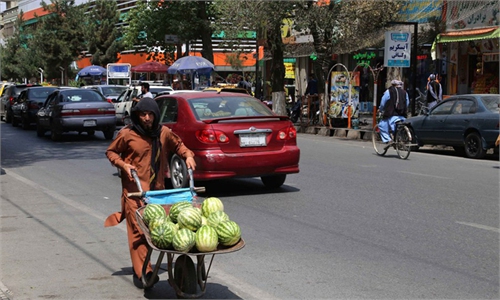Chinese firms eye resumption of freight train to Afghanistan, after $31m in emergency aid
Move to help transport aids, pave way for reconstruction: analysts

People walk on the street in Kabul, capital of Afghanistan, Aug. 31, 2021.(Photo: Xinhua)
After Chinese State Councilor and Foreign Minister Wang Yi announced 200 million yuan worth of aid to Afghanistan, Chinese merchants are hopeful that the China-Central Asia freight trains could be re-opened as soon as possible, which could be a major step in helping bring much-needed humanitarian aid to the war-torn country as well as pave the way for its future reconstruction.
Wang announced on Wednesday during a meeting with his counterparts from all other five Afghanistan's neighboring countries that China will provide Afghanistan with 3 million doses of COVID-19 vaccines, as well as emergency humanitarian aid worth 200 million yuan ($31 million), including food, medicines and other materials for winter.
"China is ready to actively discuss the resumption of China-Afghanistan freight trains… and facilitate Afghanistan's interaction with the outside world, especially its access to humanitarian supplies," Wang said, noting that neighboring countries should maintain unimpeded ports of entry with Afghanistan on the premise of ensuring security.
Wang noted that the US and its allies must shoulder their due responsibilities after their hasty pullout from Afghanistan.
Chinese analysts said such efforts to reconnect with the landlocked Central Asian country is admirable, given that a looming food crisis that could arrive in this winter. Afghanistan's economic and trade exchanges are highly dependent on land ports.
International road traffic to Afghanistan mainly involves those from north via Central Asian countries and to the south via Pakistan. And the trade route from border ports with Pakistan was the safest for the moment, analysts said.
Even when the Taliban battled for control in August, overland border trade with Pakistan was largely unaffected, with goods including fertilizers being constantly shipped across Pakistan over one thousand kilometers when they arrived in ships from Port of Karachi and the Gwadar Port.
However, Chinese logistic experts and analysts are most thrilled about the possibility of re-opening cargo train service, which has huge significance compared to airborne transport. The train also takes less time, about 15 days, compared with one to three months of the road transport via Pakistan.
Tommy Tan, president of Shanghai EPU Supply Chain Management Co, who is a veteran agent of China-EU freight trains, told the Global Times on Thursday that the development of railway traffic in Afghanistan is "a very promising event," and the railway from China to Afghanistan has met the conditions for goods delivery as long as the political situation stabilized and the environment are safe and secured.
"If conditions permit, we will also consider developing the lines [to Afghanistan] to meet the needs of the market and customers there," said Tan, noting that Afghanistan could be a logistic hub that makes it more convenient for trade in Central Asia and beyond.
The China-Europe freight train has the capacity to carry copper ore and gold ore when it is needed, Tan said, indicating the potentials for similar arrangements in Afghanistan.
The announcement on Wednesday is an indication of the implementation of the five connectivities that the Belt and Road Initiative comprises in policy, infrastructure, trade, capital flows and people-to-people exchange, Yu Minghui, director of the China Arab Economic and Trade Promotion Committee, told the Global Times on Thursday.
Yu is a founding member of the China Town in Kabul and has been involved in most Chinese-invested projects in Afghanistan. "This is a responsible approach taken by China as a major power and a concrete support for economic and trade work and the reconstruction of Afghanistan," said Yu.
In the past, cargo train from China had successfully traversed across Central Asian countries - Kazakhstan and Uzbekistan - to bring goods from China to Afghanistan.
In 2016, a cargo train from East China's Nantong arrived in Afghanistan's Hairatan, carrying 84 containers of textiles goods and daily necessities, according to a report by the Xinhua News Agency. The train came back to China three years later, carrying 1,100 tons of Afghan talcum powder.
Zhou Rong, a senior researcher at the Chongyang Institute for Financial Studies at Renmin University of China, told the Global Times on Thursday that the Central Asian cargo train can carry six to 10 times more goods than a transport plane and the train's social impacts are "much bigger."
Analysts said such positive effect could be doubled when these trains return from Afghanistan carrying popular local goods to the Chinese market, helping local people to generate an income in a time of need.
However, there are still issues to be ironed out.
Currently, Tajikistan and Uzbekistan have closed down their borders with Afghanistan. Turkmenistan, which also shares border with Afghanistan, has kept its border open but a lack of infrastructure meant international overland traffic is impossible.
"Diplomatic efforts among neighboring countries are needed so that Uzbekistan re-opens its border with Afghanistan and luckily this was also the route of China's previous China-Central Asia cargo trains used to take," Zhou said. "From this route, cargo train could enter Afghanistan to channel in much needed food, goods and other materials the locals need."
Afghanistan lacks food and energy, and its industrial products are mainly traded with China, Pakistan and India, Yan Wei, professor with the Institute of Middle Eastern Studies of Northeast University, told the Global Times on Thursday, noting that China used to have tariff-free or low tariffs on more than 90 percent of Afghan goods.



